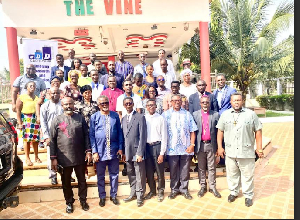 Participants of the dialogue in a group photo
Participants of the dialogue in a group photo
In a significant gathering aimed at addressing pressing human rights concerns, religious leaders from various faiths convened at the True Vine Hotel in Kumasi for a two-day dialogue from November 20–21, 2024, organized by the Center for Democratic Development (CDD-Ghana).
The discussions centered on the controversial Ghanaian Family Values Bill, 2021, which seeks to criminalize LGBTQ+ identities and activities, raising alarms among human rights advocates.
Facilitated by key figures such as Dr. Michael Augustus Akagbor, Senior Programs Officer at CDD-Ghana, and William Nyarko, Executive Director of the Centre for International Law and Accountability (ACILA), the event sought to illuminate the complexities of human rights as they pertain to sexual minorities.
Dr. Akagbor noted that many participants were initially unaware of the bill's specific provisions, leading to misconceptions fueled by its proponents.
“This dialogue has been very eventful. Many people do not know the actual contents of the bill and speculate based on the proponents' focus on the sexual aspects without understanding the broader implications,” he stated.
He pointed out that the bill includes alarming provisions, such as a duty to report individuals suspected of being part of the LGBTQ+ community, potentially endangering ordinary citizens.
The dialogue proved transformative for many attendees. “Interestingly, none of the participants had read the bill before this engagement. After our training, there was a noticeable paradigm shift in their understanding of human rights and the dangers posed by the bill,” Dr. Akagbor remarked.
He emphasized the necessity of ongoing discussions like this throughout the country to foster greater awareness and reconsideration of initial stances.
William Nyarko elaborated on the educational aspects of the dialogue, emphasizing the importance of constitutional law in discussions about human rights.
“I took them through the constitutional provisions for the protection of the rights of all persons under Chapter Five of the Constitution,” he explained.
He also traced the historical context of anti-homosexuality laws, highlighting their evolution from ecclesiastical to state law.
“Many participants initially supported the bill, but as we examined its provisions, they began to see that it poses risks not just to LGBTQ+ individuals but to everyone,” he noted.
Nyarko also raised procedural concerns regarding the bill, pointing out its violation of Article 108 of the Constitution, which mandates that any bill imposing costs on the state must originate from the executive branch.
“This is a significant hurdle that needs to be addressed,” he stated, expressing anticipation for the Supreme Court’s decision on the matter.
Participants shared their perspectives on the implications of the bill.
Bishop Christian Antwi-Bosiako of His Image Ministries expressed gratitude for the enlightening discussions, urging fellow religious leaders to oppose the bill.
“We should all rise up and speak against it. Otherwise, we will all be dealt with, even if we have good intentions,” he warned.
Evangelist Nana Afua Nsiah Aninkura of True Word Charismatic Church echoed these concerns, asserting that the bill poses risks to all citizens.
“The bill is not good at all. It puts everyone at risk,” she stated, calling on parliamentarians to reconsider its broader societal implications.
Rhoda Sarpong, a singer and evangelist trainee, highlighted the potential for unjust accusations stemming from the bill, emphasizing the need for a more nuanced legislative approach.
“Maybe you’re just friends living together, and then somebody can just report you to the police that you are lesbians,” she pointed out.
Rev. Reindorf Antwi Bosiako, General Overseer of Miracle Maker Ministry, reflected on the broader implications of human rights, asserting that everyone deserves protection.
“Every man or woman, even a child, has his or her rights,” he explained, criticizing the focus on the Ghanaian Family Values Bill, 2021, as a misplaced priority.
As the dialogue concluded, it became clear that the conversation around human rights and the treatment of sexual minorities in Ghana is evolving, with religious leaders increasingly recognizing their role in advocating for justice and equality for all citizens.